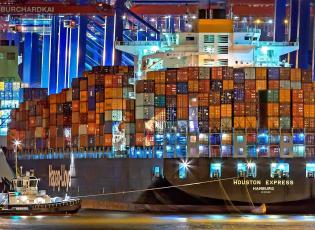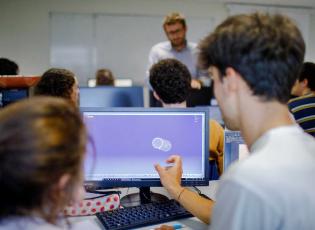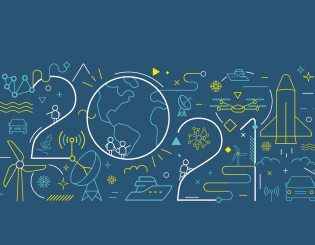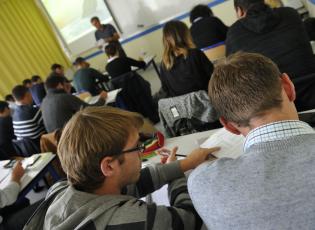
Core Curriculum Specialized Advanced Master in Maritime Project Management - Ship Maintenance
Detailed program
| UE1 : Fondamental skills - 10 ECTS |
|---|
|
| UE2 : Commercial and contractual relations - 3 ECTS |
|---|
|
| UE3 : Project - 10 ECTS |
|---|
|
Ship Maintenance option
The "Ship Maintenance" speciality of the Specialised Master's Degree in Naval Project Management - Ship Maintenance is taught at the Ecole Navale, Brest/Lanvéoc (29) and in Toulon (83) in France.
Fees and payment: The fee for the training course must be paid on the basis of half to ENSTA Bretagne and half to the Ecole Navale.
The teaching of this "Ship Maintenance" option is aimed at training professionnals who:
- Know a ship's general architecture, the characteristics of its main systems and the need to preserve the main principles of its configuration during its life cycle.
- Understand the principles involved in drawing up a ship maintenance programme (based on equipment manufacturers' recommendations, regulatory obligations, etc.) and know how to update it (based on wear and tear and operating experience, adjustments between preventive and corrective maintenance, etc.)
- Know the capacities and operating and maintenance restrictions of port infrastructures and easements required for maintenance.
- Know how to take advantage of new techniques to facilitate maintenance (CMMS software, predictive maintenance, virtual reality, innovative perspectives).
- Organise a fleet's availability by monitoring the condition of ships, scheduling maintenance periods, sharing responsibilities between those involved, supplying spare parts, etc.
- Break down the sharing of responsibilities between maintenance players in commercial contracts.
- Prepare for and supervise a ship's maintenance period, from supplying spare parts to sea acceptance tests, taking technical and calendar objectives into account on the one hand, and shipyard co-activity and safety requirements on the other.
Detailed Program
| UE4 : The ship and its maintenance schedule |
| UE5 : Port infrastructures and easements |
| UE6 : New techniques and innovative maintenance |
| UE7 : Organising fleet availability |
| UE8 : The maintenance period in the port |
For this option, part of the courses (more than 30%) are taught in English.
Maritime Project management option
The courses in this Maritime project management option prepare future graduates to:
- Act as an interface between the parties involved (inside/outside): the aim is to translate the request into technical specifications and, if necessary, to make trade-offs.
- Organise the response to the invitation to tender, and then draw up the specifications and coordinate their drafting with those involved (inside team, industrial partners, subcontractors, etc.).
- Assemble the technical team: identify resources and skills, coordinate teamwork and give impetus to the network.
- Negotiate equipment: draft technical invitations to tender for the industry, analyse bids and set up a selection procedure, and purchase the required equipment.
- Monitor compliance and quality: assess quality assurance, provide quality control.
- Communicate on the project: inform its professional networks, anticipate any resistance to the project, work in consultation with associations and civil society, and work towards the project's acceptability.
- Organize the project's documentation: produce project documents, ensure technological monitoring for equipment.
Detailed Program
| UE4 : Maritime Project Ecosystem - 12 ECTS |
|---|
|
|
UE5 : Managing a maritime project in an international context - 10 ECTS |
|---|
|
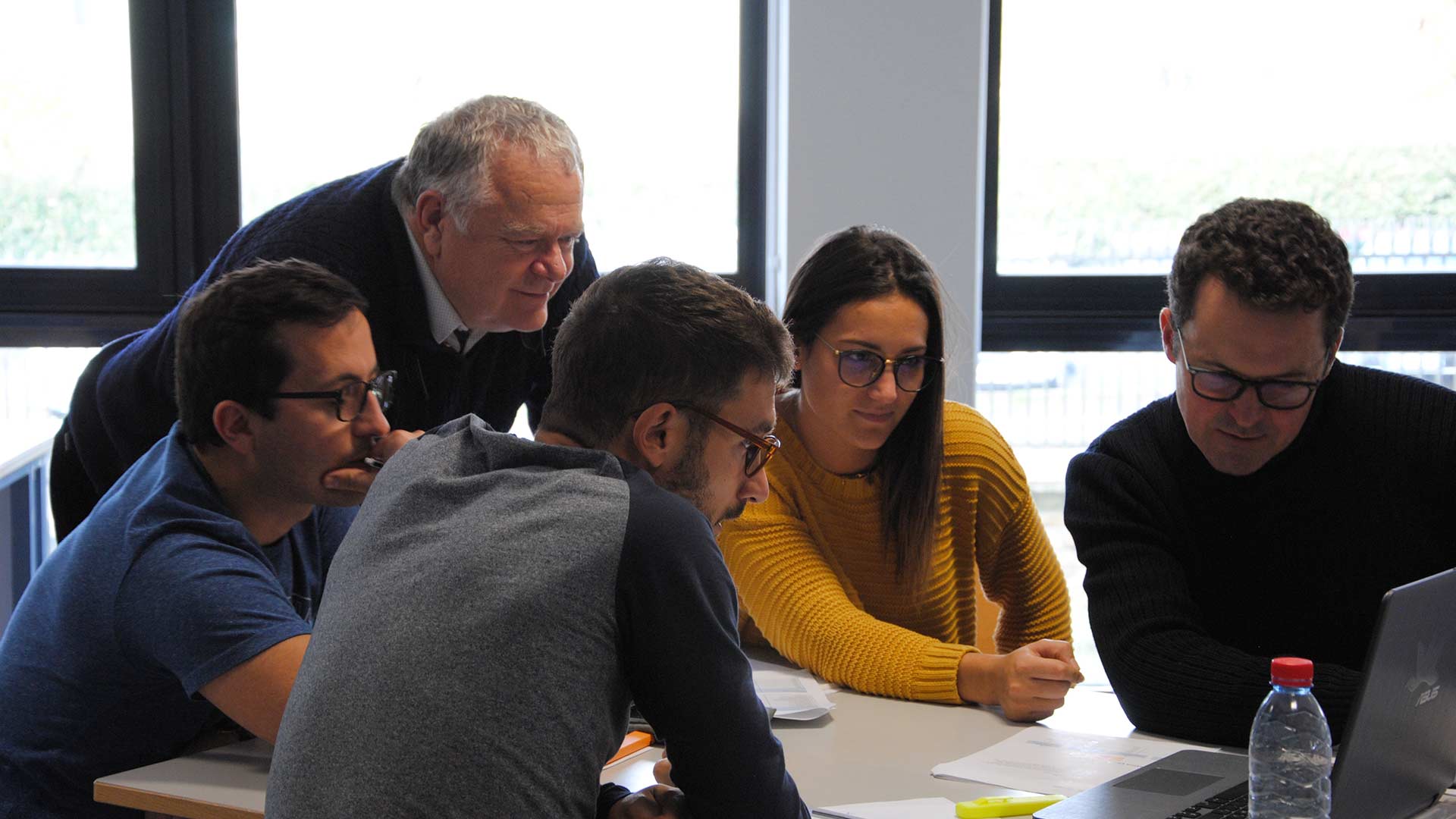
A partnership with Sciences Po Rennes
Within the context of this "Naval Project Management" course, a partnership has been set up with Sciences Po Rennes. It provides a strong interdisciplinary approach to teaching.
contact
Humanities & social sciences modules
Management and humanities, sport, languages
Humanities & social sciences modules are aimed at giving students the opportunity to develop their managerial, interpersonal and social skills through an approach that prepares them for the workplace and encourages them to become independent and responsible engineers.
The goal is to equip them with the skills necessary to design, conduct and monitor socio-technical systems and projects within intercultural and international settings, in which they champion sustainable, responsible innovation that meets the challenges of today’s world.
The management and humanities, languages and sport modules share common learning outcomes which can be split into three main categories.
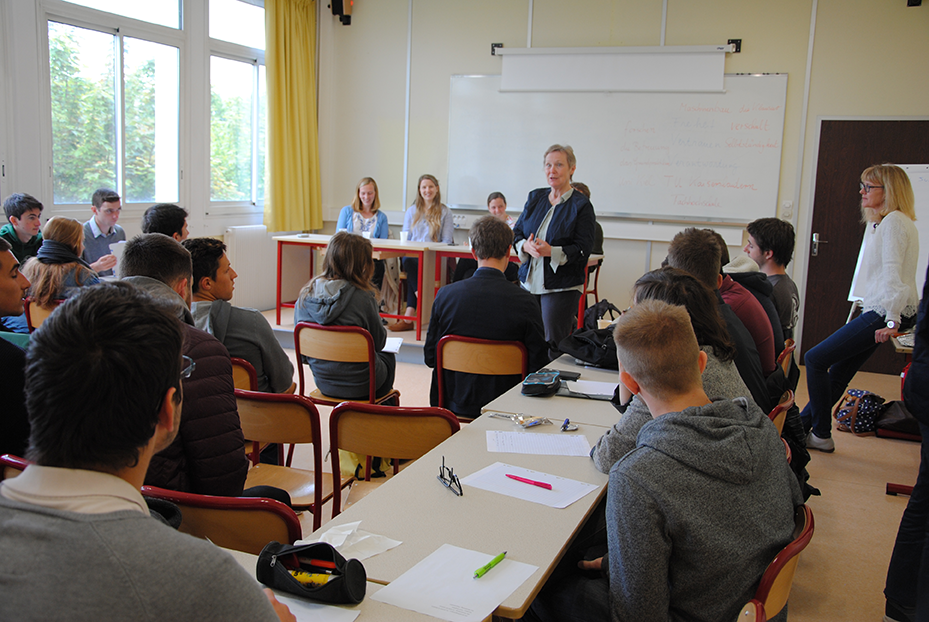
Learning outcomes linked to students’ personal and professional plans and development
These goals have to do with the microsocial level and therefore focus on each student as an individual. The aim is to support students in their personal development. They will be able to use the intellectual and practical tools available to fine-tune their study and career plans, gain in confidence, develop their character and build a fulfilling future for themselves as an engineer in today’s socio-economic environments.
Examples of modules:
- In management and humanities: engineering and society, stress management, resume- and cover letter-writing
- In languages: job seeking, rhetoric, improvisation and ethical dilemmas, living and becoming an engineer in an international and intercultural setting
- In sport: self-knowledge, personal well-being and exercise

Learning outcomes linked to future engineers’ effectiveness as leaders
These modules bear on the meso-social level and therefore focus on how organizations work, particularly businesses and public institutions. A number of modules therefore set out to support students in acquiring the managerial skills that will help them to easily find their place within organizations and to perform line management duties.
Examples of modules:
- In management and humanities: engineering and society, stress management, resume- and cover letter-writing
- In languages: communication in the working world, how to present and pitch, gender awareness, negotiating, being an engineer in an international and intercultural setting
- In sport: team management
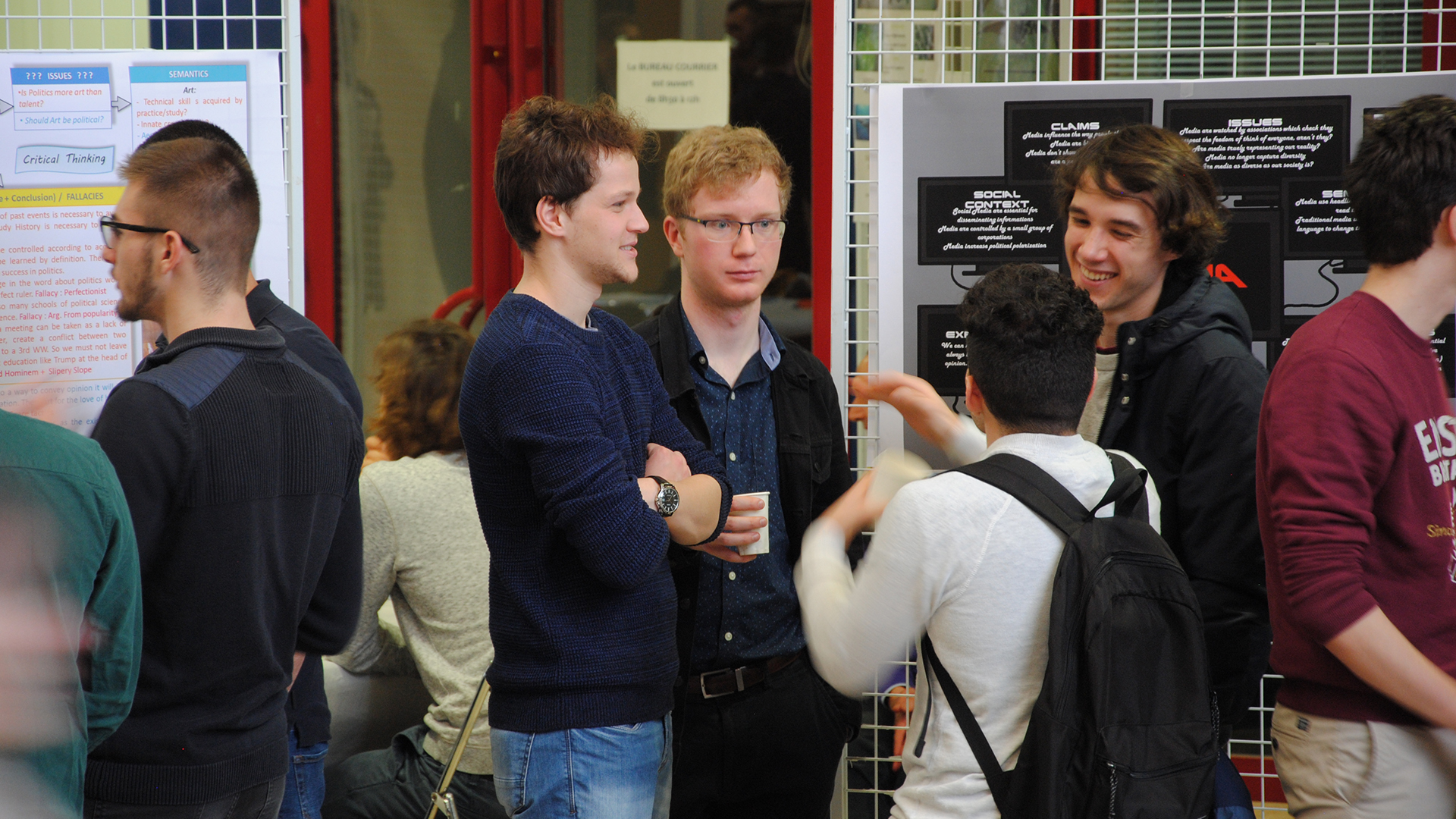
Cultural learning outcomes
These modules concern the macrosocial level. The approach takes a long-term perspective and combines the expectations of businesses with society’s needs in the broad sense. Here, the focus is on general culture and the introspective side of the students’ intellectual development. Our modules seek to train thoughtful, tactful engineers who are mindful of the social, environmental and ethical considerations and sustainable development, with a holistic vision of projects on which they will work with account taken of both the social and technical aspects.
Examples of modules:
- In management and humanities: human societies and environment, geopolitics, philosophy and technology, civilization of the Arab world
- In languages: Science & Society, Critical Thinking, Debating (UN & British Parliament), American culture, Tech Culture
- In sport: exercise in the great outdoors
MSc application process
Recruitment schedule for the 2023/2024 school year
- Step 1: From October 5, 2022 to April 3, 2023 inclusive*: Online provisional enrollment.
- Step 2: Submission of your complete application and payment of the application fee
All the documents included in your application must be sent to us by April 4* at the latest and the €30 application fee paid.
International students: Don’t leave your application until the last minute! We recommend that you complete it in good time (you may need to allow time to apply for a visa for example). - Step 3:The jury analyzes the complete applications during the year. Selection interviews and level tests may be organized.
- Step 4: Admission results
They will be sent to you by email. - Step 5: Confirmation
In order to confirm your enrollment on an ENSTA Bretagne course, a non-refundable deposit of €500 must be paid.
* The application period may exceptionally be extended for applicants from partner institutions.
Vous êtes candidat international* non européen et vous ne résidez pas en Europe, vous dépendez du dispositif Etudes En France (EEF)
Deux procédures doivent être réalisées en parallèle :
- Rendez-vous sur la plateforme Etudes en France et suivez la procédure indiquée
- Vous devez également déposer un dossier de candidature en ligne sur la plateforme ENSTA Bretagne :
- Pré-inscription en ligne
- Dépôt de votre dossier complet et paiement des frais de dossier
L'ensemble des pièces constitutives de votre dossier doivent nous être transmises au plus tard le 3 avril* et les 30€ de frais de dossiers réglés.
Étudiants internationaux : Nous vous encourageons à renseigner au plus tôt votre dossier complet (procédure éventuelle de demande de visa). - Des entretiens de sélection et tests de niveaux peuvent être organisés.
- Résultats d’admission : Ils vous seront transmis par mail
- Confirmation : Afin de confirmer votre intégration dans un cursus de l'ENSTA Bretagne, une somme de 500€ (arrhes non remboursables) devra être versée.
* La liste des candidats de nationalité étrangère relevant de la procédure Etude en France est précisée sur le site dédié.
Si vous résidez en France ou en Europe, vous pouvez candidater sur la plateforme Mon Master (lire plus haut).
Important note: In order to obtain a visa, international students must, in addition to this application process, follow the relevant procedure on the Campus France website.
Particular case : To get admission for the MSc Automotive Engineering, you have to submit your application on the dedicated website.
Admission requirements
To enroll for one of our MSc programs, you must hold a BSc degree or equivalent.
Language Level
The candidate’s level of language should enable him or her to follow classes taught in French and English. A minimum level of B1 is recommended in both languages.
https://www.coe.int/en/web/portfolio/self-assessment-grid.
Selection Criteria
Application. Selection interviews and level assessment tests can be organized.
Fees
Find out about application fees and tuition
Graduation requirements
This degree is awarded to all students who have passed the written examinations, practical examinations and successfully completed their final project.
Lire aussi
MSC AUTOMOTIVE ENGINEERING Program
SEMESTER 1 - 1st YEAR
4 Course Units (CE), 30 ECTS
| CU 1.1 Core Subjects for Mechanics | Lessons (55 minutes) | ECTS |
|---|---|---|
| Mathematics | 36 | |
| Materials | 60 | |
| Finite Elements | 48 | |
| TOTAL | 9 |
| CU 1.2 Mechanical engineering and heat engines | Lessons (55 minutes) | ECTS |
|---|---|---|
| Mechanical Engineering | 32 | |
| Power Transmission Systems | 60 | |
| Thermics/Thermodynamics | 23 | |
| Thermics/Thermodynamics | 19 | |
| TOTAL | 10 |
| CU 1.3 Human and Social Sciences, Language learning | Lessons (55 minutes) | ECTS |
|---|---|---|
| LL 1 English | 28 | |
| TOTAL | 2 |
| CU 1.4 Project | Lessons (55 minutes) | ECTS |
|---|---|---|
| Systems Engineering | 28 | |
| Field Application Project | 80 | |
| TOTAL | 9 |
SEMESTER 2 - 1st YEAR
5 CU, 30 ECTS
| CU 2.1 Composites, Materials, Vibrations | Lessons (55 minutes) | ECTS |
|---|---|---|
| Composites Materials | 21 | |
| Plates and Beams | 21 | |
| Vibrations | 42 | |
| TOTAL | 8 |
| CU 2.2 Vehicle Architecture | Lessons (55 minutes) | ECTS |
|---|---|---|
| Vehicle Dynamics | 60 | |
| Electric Vehicles | 22 | |
| TOTAL | 9 |
OR
| CU 2.2 Advanced Modeling of materials and Structures | Lessons (55 minutes) | ECTS |
|---|---|---|
| Introduction to Advanced Modeling of materials and Structures | 60 | |
| Optimization | 42 | |
| TOTAL | 9 |
| CU 2.3 Human and Social Sciences, Language learning | Lessons (55 minutes) | ECTS |
|---|---|---|
| LL1 English | 14 | |
| Business Game | 24 | |
| TOTAL | 4 |
| CU 2.4 Project | Lessons (55 minutes) | ECTS |
|---|---|---|
| The Enhanced Focus Project | 126 | |
| TOTAL | 9 |
SEMESTER 3 - 2nd YEAR
VEHICLE ARCHITECTURE PROFILE : 5 CU, 30 ECTS
| CU 3.1 - Vehicle Architecture | Lessons (55 minutes) | ECTS |
|---|---|---|
| Vehicle Architecture | 68 | |
| Systems Engineering | 30 | |
| Design in an automotive environment | 58 | |
| TOTAL | 9 |
| CU 3.2 - Powertrains | Lessons (55 minutes) | ECTS |
|---|---|---|
| Thermal engines | 18 | |
| Hybridization and hydrogen | 24 | |
| Power Transmission | 60 | |
| Electric vehicle architecture | 24 | |
| TOTAL | 9 |
| CU 3.3 Human and Social Sciences, Language Learning | Lessons (55 minutes) | ECTS |
|---|---|---|
| Leadership | 28 | |
| Language | 24 | |
| TOTAL | 4 |
| CU 3.4 AV - Materials and Structures | Lessons (55 minutes) | ECTS |
|---|---|---|
| Finite Elements and Non-Linearity | 60 | |
| Thermodynamics and Behavior Laws | 34 | |
| Fatigue | 20 | |
| TOTAL | 8 |
ADVANCED MODELING OF MATERIALS AND STRUCTURES PROFILE : 5 CU, 30 ECTS
| CU 3.1 Advanced Modeling of materials and structures | Lessons (55 minutes) | ECTS |
|---|---|---|
| Elastomers and composite Materials | 60 | |
| Multiscale behavior modeling | 60 | |
| Fatigue and Experimental Techniques | 60 | |
| TOTAL | 12 |
| CU 3.2 Specific Applied Forces | Lessons (55 minutes) | ECTS |
|---|---|---|
| Modeling and analysis of problems related to rapid dynamics | 44 | |
| Stabilityand nonlinear mechanics | 46 | |
| TOTAL | 6 |
| CU 3.3 Human and Social Sciences, Language Learning | Lessons (55 minutes) | ECTS |
|---|---|---|
| Leadership | 28 | |
| Language | 24 | |
| TOTAL | 4 |
| CU 3.4 Modeling of materials and structures | Lessons (55 minutes) | ECTS |
|---|---|---|
| Non-linear Finite Elements | 60 | |
| Thermodynamics and Constitutive Equations | 60 | |
| TOTAL | 8 |
SEMESTER 4 - 2nd YEAR
2 CU, 30 ECTS
| CU 4.1 Project | Lessons (55 minutes) | ECTS |
|---|---|---|
| Enhanced Focus Project | 132 | |
| TOTAL | 5 |
| CU 4.2 Internship | Lessons (55 minutes) | ECTS |
|---|---|---|
| Internship | ||
| TOTAL | 25 |
The classes marked with an * in this page are suitable for English speakers (course material and/or teaching in English). The candidate’s level of language should enable him or her to follow classes taught in French and English. A minimum level of B1 is recommended in both languages. All students may take their exams in English.
The courses and ECTS listed in this page are for information purposes only. They are liable to change in line with company expectations. These developments are part of the continuous improvement plan. ENSTA Bretagne has receveived the ISO 9001 accreditation for all its activities.






